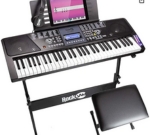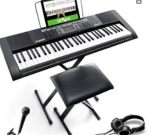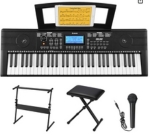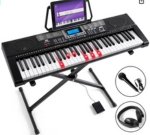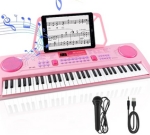Your Ultimate Guide to Finding the Perfect Piano Keyboard

Hey there, fellow music enthusiast! If you’re on the hunt for the best piano keyboard to suit your musical journey, you’ve come to the right place. As a pianist and keyboard enthusiast myself, I understand the importance of finding an instrument that not only sounds great but also feels like an extension of your musical expression. So, let’s dive into this comprehensive guide to help you find your perfect match.
Understanding Piano Keyboards
Before we jump into the nitty-gritty of choosing a keyboard, let’s take a moment to understand the different types available. You’ve got your traditional acoustic pianos, digital keyboards, and even hybrid models that blend the best of both worlds.
Acoustic vs. Digital vs. Hybrid: Acoustic pianos offer that timeless, authentic sound and feel, but they can be bulky and expensive. Digital keyboards, on the other hand, come with a variety of sounds, features, and portability options. Hybrid pianos aim to combine the rich sound of acoustic pianos with the versatility of digital keyboards.
Top Recommendations
RockJam 61 Key Keyboard Piano
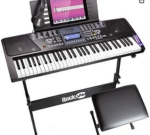
Key features and specifications
| Feature | Specification |
|---|---|
| Number of Keys | 61 (full-size) |
| Display | LCD |
| Sounds | Multiple (details not specified) |
| Rhythms | Multiple (details not specified) |
| Learning App | Simply Piano (free access) |
| Additional Accessories | Stand, bench, headphones, note stickers |
The RockJam 61 Key Keyboard Piano is a comprehensive kit aimed at aspiring musicians, especially beginners. It includes everything you need to get started, including the keyboard itself, a stand, adjustable bench, headphones, access to the Simply Piano app, and even note stickers for easier learning.
Alesis Melody 61 Key Keyboard Piano
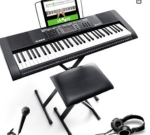
Key features and specifications of the Alesis Melody 61 MKII:
| Feature | Specification |
|---|---|
| Number of Keys | 61 (full-size) |
| Sounds | 300 |
| Rhythms | 300 |
| Demo Songs | 40 |
| Learning Resources | 3-month Skoove subscription |
| Additional Accessories | Stand, bench, headphones, microphone, sheet music stand |
The Alesis Melody 61 MKII is a beginner-friendly keyboard packed with features to jumpstart your musical journey. This all-inclusive package includes everything you need to get started, eliminating the need for separate accessory purchases.
Donner 61-Key Electric Piano Keyboard with Microphone
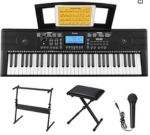
Key features and specifications of the Donner DEK-610:
| Feature | Specification |
|---|---|
| Number of Keys | 61 (full-size) |
| Sounds | 249 Voices |
| Rhythms | 249 |
| Demo Songs | 50 |
| Learning Features | LCD display, record function, 3 teaching modes |
| Additional Accessories | Microphone, stand, adjustable stool |
The Donner DEK-610 is an electric piano keyboard catering to both aspiring and casual musicians. This feature-packed instrument offers a complete starter kit, eliminating the need for additional equipment purchases.
MUSTAR Piano Keyboard
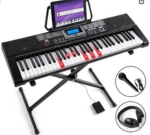
Key features and specifications of the MUSTAR MEKS-500:
| Feature | Specification |
|---|---|
| Number of Keys | 61 (full-size) with lighted keys |
| Sounds | Multiple (details not specified) |
| Rhythms | Multiple (details not specified) |
| Demo Songs | Included |
| Learning Features | Sustain pedal, USB MIDI connectivity |
| Additional Accessories | Stand, headphones, microphone |
The MUSTAR MEKS-500 is a learning keyboard designed specifically for aspiring musicians, particularly beginners. It boasts a range of features that make learning piano fun and engaging.
WOSTOO Kids Keyboard Piano, Portable 61
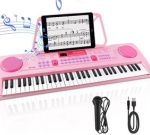
Key features and specifications of the WOSTOO Kids Keyboard Piano:
| Feature | Specification |
|---|---|
| Number of Keys | 61 |
| Sounds & Rhythms | Multiple (details not specified) |
| Learning Features | Lesson mode with light-up keys |
| Additional Accessories | Music stand, microphone |
| Design | Portable |
The WOSTOO Kids Keyboard Piano is a colorful and feature-rich instrument designed to spark a child’s interest in music. This portable keyboard is perfect for young beginners, offering a playful introduction to the world of piano playing.
Factors to Consider
Now that you have a basic understanding of the types of keyboards available, let’s delve into the key factors you should consider when making your decision.
Touch and Feel:
One of the most crucial aspects of a piano keyboard is how it feels to play. As a pianist, I can’t stress enough how important it is to find a keyboard with a touch and feel that suits your playing style. Whether you prefer the weighted keys of an acoustic piano or the lighter touch of a digital keyboard, make sure to spend some time testing out different models to find the right fit for you.
Sound Quality:
Another essential factor to consider is the sound quality of the keyboard. After all, what’s the point of playing if it doesn’t sound good, right? Look for keyboards with high-quality sound engines and realistic instrument samples. Personally, I love keyboards that offer a wide range of expressive piano sounds, but it’s also nice to have additional instrument options for versatility.
Size and Portability:
Are you planning to gig regularly with your keyboard, or will it mainly stay put in your home studio? Consider the size and weight of the keyboard to ensure it fits your lifestyle. I learned this the hard way when I lugged around a massive keyboard to gigs for months before finally investing in a more portable model.
Connectivity:
In today’s digital age, connectivity is key. Look for keyboards with a variety of connectivity options, such as MIDI, USB, audio outputs, and Bluetooth. These features will not only make it easier to integrate your keyboard into your setup but also allow for seamless communication with other devices and software.
Additional Features:
Finally, don’t forget to consider any extra features that may enhance your playing experience. Whether it’s built-in speakers, recording capabilities, or educational tools, these added bonuses can take your keyboard playing to the next level.
Expert Tips for Choosing
Now that you have some top recommendations to consider, here are a few expert tips to help you make your final decision.
Try Before You Buy: Whenever possible, test out different keyboards in person to get a feel for their touch, sound, and overall vibe. You’d be surprised how much your opinion can change once you actually sit down and play.
Do Your Research: Take the time to read reviews, watch demo videos, and ask for recommendations from fellow musicians. Hearing firsthand experiences can provide valuable insights that you might not get from simply reading product descriptions.
Consider Your Long-Term Goals: Think about where you see yourself and your music in the future. Are you looking for a keyboard to grow with you as you progress, or are you simply looking for something to get you started?
Set a Budget: It’s easy to get carried away with all the fancy features and bells and whistles, but it’s important to set a realistic budget and stick to it. Remember, the best keyboard for you is one that not only meets your needs but also fits within your budget.
Conclusion
Finding the perfect piano keyboard may seem like a daunting task, but armed with the right knowledge and guidance, you’ll be well on your way to making the perfect choice. Whether you’re a beginner just starting out or a seasoned pro looking to upgrade your setup, remember to prioritize touch, sound quality, portability, connectivity, and additional features to find the keyboard that speaks to you and your musical journey. Happy playing!
